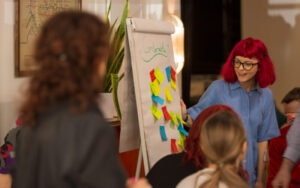The 4 Major Influences on Team Productivity
An insight into Team Productivity topics covered in our Introductory Modules
There is no “one-size-fits-all” culture to transform a team’s productivity. What works for one team may not be right for another.
What we have learnt from our extensive work with organisations and teams is that to thrive and increase productivity, our relationships at work need to become more self-aware. Arguably, our relationships at work matter just as much as our personal relationships, given that we spend the majority of our time at work!
We have found the following 4 traits consistently present in companies with thriving team productivity:
1. Team Positivity – focus on the ratio.
We know that teams with high social/emotional intelligence create empathetic positive cultures, which has an impact on innovation and productivity. How can positivity within a team be improved?
Gottman’s 5:1 ratio
John Gottman (PhD) (best-selling author and relationship psychologist) has found through extensive research that a 5:1 ratio of positive to negative interactions can drastically improve the environment within a relationship.
Increasing positive interactions can be as simple as acknowledging work that has been done well, recognising team members’ skills, or the contributions they make in ways that aren’t always linked to producing work (like organising social events, being available to other team members or voicing things that are difficult to say).
The objective is to keep adding to the positivity bank. Remember, if there aren’t enough positive interactions, the spiralling impact on productivity is huge!
2. Team Conflict – happens all the time! Learn ways to increase positivity during conflict.
When we feel attacked (or when we are in conflict), it’s all too easy to fall into learnt habits: say things we don’t mean, blame others, defend our position, ignore problems altogether… Lets face it we have done all these at some point!
To avoid these patterns, educate your team about their go-to conflict styles; explore the real need/request behind the toxic communication. Revealing this information is the most important step towards creating a constructive dialogue during conflict.
3. Team Alignment – share common goals!
Colleagues may get on well, or they may not like each other! Not every relationship has the capacity to be a friendship.
Any working relationship has the potential to be successful if, at the very least, the individuals share a common goal. To ensure this, make time to get aligned on your goals (small and big).
4. Team Roles – Let them go!
Roles are not people! They belong to the organisation and their purpose is to fulfil functions that contribute to success of the business. Over time, as the business evolves, the importance and/or relevance of roles will shift and may need to be re-defined. This has very little to do with the person occupying that role.
Keep collaborating with your team – share your knowledge and skills and be open about how you feel about the tasks within your role. This will improve your communication, build stronger relationships and of course – increase productivity!
To develop your skills in understanding what makes your team tick, join us on our next introductory ORSC course in London (ORS@Work). Find out more about the course and view upcoming dates here.






